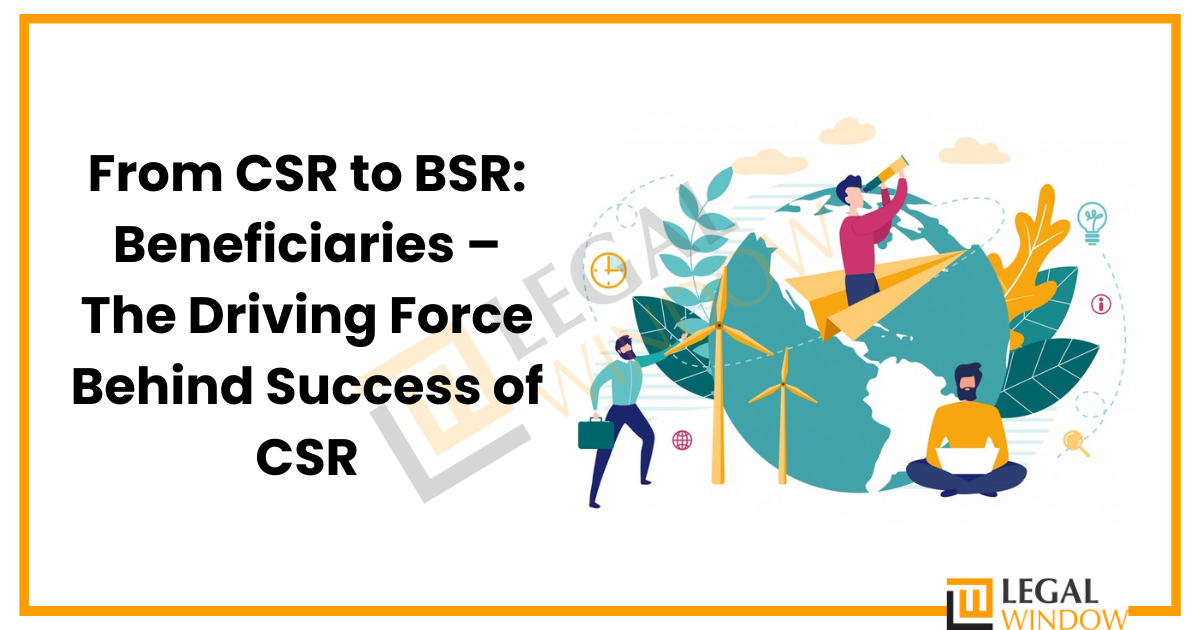From CSR to BSR: Beneficiaries – The Driving Force Behind Success of CSR
- January 4, 2024
- Miscellaneous

Businesses have a strong desire to have a positive social impact and to give back to the communities that help them. Similarly, the government contributes significantly to the improvement of society through the distribution of resources and the implementation of laws that meet popular aspirations. Moving from CSR to BSR that is, CSR (Corporate Social Responsibility) to BSR (Beneficiary Social Responsibility) shifts the focus to the real stars of social impact: the beneficiaries. CSR is about companies doing good things, but BSR puts the people who benefit at the centre. While corporations and governments play critical roles in constructing infrastructure for the public benefit, beneficiaries play an important role in maintaining the long-term viability and efficacy of these improvements.
Table of Content
What is CSR and BSR?
A self-policing business concept known as “corporate social responsibility” (CSR) assists an organisation in being held socially responsible by the public, its stakeholders, and itself. Companies can be aware of their impact on the social, economic, and environmental facets of society by engaging in corporate social responsibility, often known as corporate citizenship. CSR Goals Examples may include environmental sustainability, education promotion, or healthcare access.
Beneficiary social responsibility, or BSR, is a contemporary strategy that reorients social responsibility programs to emphasise the needs and effects on the beneficiaries, or the people these initiatives are meant to assist, rather than just what businesses or organisations do, as is the case with traditional Corporate Social Responsibility, or CSR. Understanding, addressing, and enhancing the lives of the people or communities benefited by social projects are important components of BSR.
Key Differences Between CSR and BSR
Certainly, here’s a breakdown of the key differences between CSR and BSR ,integrating the specified keywords:
Focus and Approach:
- CSR revolves around corporate initiatives supporting social causes without direct emphasis on beneficiaries.
- BSR shifts the focus from company-driven actions to prioritising the well-being and needs of beneficiaries.
Strategies and Engagement
- CSR traditionally employs various strategies like philanthropy, sustainability, or community development.
- BSR requires active beneficiary engagement, aligning strategies with their needs for impactful social change.
Integration into Business Strategy
- CSR: CSR activities are often seen as separate from the core business operations and are considered as add-on initiatives. They are usually driven by a company’s desire to give back to the community or enhance its public image.
- BSR: Business sustainability is integrated into the core business strategy. It entails taking sustainability concerns into account while making decisions and developing products, managing the supply chain, and creating overall business plans.
Responsibilities as a Beneficiaries
- Gratitude and Appreciation: First and foremost, beneficiaries should express gratitude for the opportunities and resources bestowed upon them. Recognising the efforts made by Corporates and the Government can foster a sense of appreciation and acknowledgment. Whether it’s through a simple thank you or actively participating in community events, beneficiaries can show their gratitude by valuing the support they receive.
- Active participation: Active participation in community development activities is essential. Beneficiaries have a unique viewpoint and understanding of their community’s difficulties and needs. Beneficiaries can help shape the path of these projects and ensure they suit the specific needs of the community by actively engaging in community meetings, providing feedback, and suggesting ideas for improvement. As BSR Rate Analysis evaluates the success and impact of BSR initiatives on beneficiaries, measuring their empowerment and well-being as a result of these efforts.
- Preservation and maintenance: Beneficiaries must also conserve and maintain the substance and quality of the infrastructure given. Roads, for example, can only stay safe and efficient if users avoid littering, breaking road signs, and driving recklessly. Similarly, those who use public parks must take care to keep them clean and free of vandalism.
- Responsible Use: Recipients are required to make responsible use of the infrastructure offered. For example, when it comes to educational establishments, both instructors and learners ought to endeavour to maximize the available resources and prospects. Using resources wisely and minimising waste helps guarantee that they can be sustained over time, whether they be water, power, or any other resource that is made available. This is not simply good for the environment. It is imperative that the resources and infrastructure made accessible to them are possessed by the beneficiaries.
- Advocacy and Accountability: The Modern Era of Corporate Social Responsibility marks a shift toward BSR, emphasising beneficiary-centric approaches over company-driven activities. Recipients must also make governments and corporations responsible for the infrastructure they have supplied. This may entail promoting the required upgrades, dealing with problems of mismanagement or corruption, and making sure the infrastructure is used by everyone in the neighbourhood.
Conclusion
While governments and businesses are primarily responsible for providing the necessary infrastructure, beneficiaries also have a part to play in making sure these efforts are successful and long-lasting. They are accountable for more than just getting benefits. Beneficiaries have the ability to shed light on the effectiveness of CSR initiatives, much like the moon does on the night sky. Their enthusiastic involvement, expressions of thanks, and efficient use of resources are like the stars that point us in the direction of a brighter future. Beneficiaries increase the effect of CSR programs by accepting their part in the process and turning from being just recipients into change agents. Infrastructure projects can only fully realise their intended purpose and benefit society as a whole when there is reciprocal accountability.
LegalWindow.in is a professional technology driven platform of multidisciplined experts like CA/CS/Lawyers spanning with an aim to provide concrete solution to individuals, start-ups and other business organisation by maximising their growth at an affordable cost. Our team offers expertise solutions in various fields that include Corporate Laws, Direct Taxations, GST Matters, IP Registrations and other Legal Affairs.
Categories
- Agreement Drafting (23)
- Annual Compliance (11)
- Change in Business (36)
- Company Law (148)
- Compliance (90)
- Digital Banking (3)
- Drug License (3)
- FEMA (17)
- Finance Company (42)
- Foreign Taxation (6)
- FSSAI License/Registration (14)
- GST (120)
- Hallmark Registration (1)
- Income Tax (202)
- Latest News (34)
- Miscellaneous (165)
- NBFC Registration (8)
- NGO (14)
- SEBI Registration (6)
- Section 8 Company (7)
- Start and manage a business (21)
- Startup/ Registration (130)
- Trademark Registration/IPR (40)
Recent Posts
About us
LegalWindow.in is a professional technology driven platform of multidisciplined experts like CA/CS/Lawyers spanning with an aim to provide concrete solution to individuals, start-ups and other business organisation by maximising their growth at an affordable cost.








